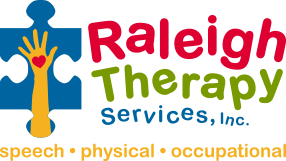~Submitted by Whitney Woodhull-Smith, DPT-Raleigh Therapy Services Physical Therapist

Eat Smart, Move More!
Childhood obesity is a growing epidemic in North Carolina and the United States. Physical activity is one of the key lifestyle factors that can help you and your children achieve and maintain a healthy weight.
Please visit www.eatsmartmovemorenc.com for more information.
A take home message to apply to your every day life from this great site: “5-3-2-1-Almost None”
- 5 or more servings of fruits and vegetables daily
- 3 structured meals daily – eat breakfast, less fast food, and more meals prepared at home
- 2 hours or less of TV or video games daily
- 1 hour or more of moderate to vigorous physical activity daily
- Limit sugar-sweetened drinks to “almost none”
Filed under: Awareness, Physical Therapy, RTS Team, Therapy Ideas

April is occupational therapy month and at RTS, we have awesome occupational therapists who provide extraordinary care and services to their patients! Our occupational therapists are a vital part of our team and help our speech therapists and physical therapists as well as caregivers know how to best work with children who may have fine motor delays, visual perceptual difficulties, sensory processing issues, handwriting problems, etc.
For more information about our occupational therapists and possible reasons for an evaluation or treatment, please visit the occupational therapy page of our website. Also, check back for new blog posts related to occupational therapy during the month of April.
Filed under: Advocacy, Events, RTS Team
~Submitted by Whitney Woodhull-Smith, DPT
Torticollis is the tightening or shortening of the sternocleidomastoid (SCM) muscle (a neck muscle). This tightness causes the head to lean toward the tight muscle and turn away from it. Torticollis is the third most common congenital musculoskeletal anomaly in newborns. It is not always known why torticollis occurs, but it is often caused by the position of the head or neck in utero or during labor and delivery. Plagiocephaly (flattening of the skull) is often related to torticollis and is worsened by spending too much time lying on the back. With torticollis there is a muscle imbalance and the baby has difficulty maintaining their head in the middle. The neck is tight when moved in the opposite direction.
Torticollis is treated with physical therapy. Performing stretches that your PT teaches you is vital to improving the baby’s condition. Physical therapy focuses on stretching the tightened SCM and strengthening the opposite SCM. It also addresses the baby’s gross motor development. Tummy time is key to strengthening neck muscles and slowing down the flattening of the head. If left untreated, torticollis can affect the baby’s skull, facial development, and alignment. Please make an appointment with your pediatrician if you are concerned about your baby’s neck or head shape.

Filed under: RTS Team, Therapy Ideas, Topics





